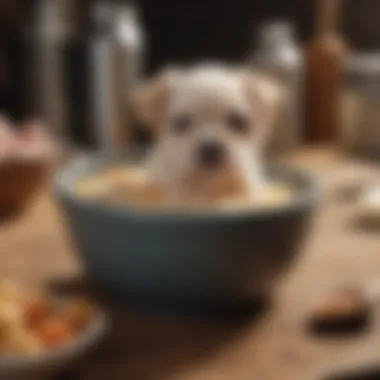Effective Diet Tips for Puppies Experiencing Diarrhea


Intro
Puppies, with their boundless energy and curiosity, often face health issues that can be concerning for their owners. Diarrhea is a common yet distressing situation that puppies can encounter. During these times, understanding how to adjust their diet is crucial for recovery and well-being. This article seeks to inform pet owners about the specific dietary practices that can assist puppies suffering from diarrhea. We will discuss suitable feeding options, hydration methods, and important signs that may indicate a need for veterinary care. By providing practical knowledge, we aim to enable pet owners to support their puppy's digestive health effectively.
Dietary Adjustments for Diarrhea
When a puppy experiences diarrhea, it is essential to focus on what to feed them. The objective is to offer easily digestible foods that can help restore normal bowel function.
Initially Assessing Your Puppy’s Condition
Before adjusting the diet, assess the puppy’s overall health. Look for signs of dehydration, lethargy, or blood in stool. If any of these symptoms manifest, seek veterinary advice promptly.
Suitable Feeding Options
- Bland Diet: Start with a bland diet to minimize digestive strain. Common choices are:
- Commercial Diets: Some pet foods are specifically formulated for digestive health. Brands like Royal Canin Veterinary Diet or Hill's Prescription Diet can be beneficial during episodes of diarrhea.
- Probiotics: These can help restore the natural balance of gut bacteria. Products like Fortiflora can be considered to support digestive recovery.
- Boiled white rice mixed with boiled chicken (no skin or bones)
- Plain boiled potatoes or sweet potatoes
- Plain pumpkin (not spiced or sweetened)
Hydration Matters
Hydration is just as important as diet. Puppies with diarrhea can lose substantial fluids and electrolytes. Ensure your puppy has constant access to fresh water. You might also consider:
- Oral Rehydration Solutions: These can help replace lost electrolytes.
- Broth: Low-sodium chicken or beef broth can be tempting and hydrating.
Keep in mind, if a puppy refuses water, or shows signs of extreme dehydration, contact a veterinarian.
Monitoring and When to Seek Help
It’s crucial to closely monitor your puppy's condition during this time:
- If diarrhea persists for more than 24 hours
- If vomiting occurs along with diarrhea
- If there is blood in the stool or if the puppy appears in pain
In such cases, visiting a veterinarian will be necessary to explore possible underlying causes and treatments.
Long-term Dietary Practices
Once the puppy recovers, consider gradually reintroducing normal food. Follow these steps:
- Slowly mix regular food with the bland diet over several days.
- Return to standard feeding methods gradually, observing for any recurrence of diarrhea.
The End
Feeding a puppy with diarrhea requires careful consideration of their diet and hydration. Every puppy may respond differently, so it’s vital to observe closely and make timely decisions. In sum, providing a bland diet, maintaining hydration, and knowing when to consult a veterinarian lays the groundwork for a speedy recovery. With the right approach, owners can aid their furry companions during a challenging time.
Understanding Diarrhea in Puppies
Understanding diarrhea in puppies is foundational for ensuring their health and recovery. Diarrhea may not seem like a critical issue at first glance, but it can lead to dehydration and other complications if not addressed promptly. Recognizing the nature and cause of the diarrhea can guide pet owners in making informed dietary choices, ultimately aiding in quicker recovery. An informed approach helps in reducing stress for both the puppy and its owner, paving the way for a smoother recovery process.
Common Causes of Diarrhea
Puppies can experience diarrhea due to a variety of reasons. Several commonly observed causes include:
- Dietary Changes: Sudden changes in diet or introduction of new foods can upset a puppy’s digestive system.
- Infections: Bacterial, viral, or parasitic infections can lead to gastrointestinal upset.
- Stress: Changes in the environment, such as moving to a new home, can cause significant anxiety in puppies, triggering diarrhea.
- Food Intolerances and Allergies: Certain ingredients may not agree with a puppy's digestive system, resulting in diarrhea.
- Toxins: Ingestion of harmful substances can also be a cause.
Recognizing these triggers early is vital in managing diarrhea and returning the puppy to optimal health.
Recognizing Symptoms


Identifying the symptoms associated with diarrhea is crucial for effective intervention. The common signs include:
- Frequent Loose Stools: This is the most apparent indication that something is wrong.
- Blood or Mucus: Presence of blood or mucus in the stool warrants immediate veterinary attention.
- Abdominal Discomfort: Puppies may show signs of discomfort or pain in their abdomen.
- Dehydration Signs: Lethargy, dry gums, and excessive thirst can accompany diarrhea.
- Loss of Appetite: Refusal to eat is another common symptom.
By being vigilant about these signs, pet owners can take the necessary steps to address the condition swiftly.
Nutritional Considerations
When a puppy experiences diarrhea, nutritional considerations become critical. The right diet can play a pivotal role in their recovery and overall health. Puppies have delicate digestive systems, so understanding how to adjust their feeding regimen is essential. This section will discuss the role of diet in puppy health and the importance of digestibility.
Role of Diet in Puppy Health
The foundation of a puppy's health is its diet. A well-balanced diet supports growth, strength, and immune function. When puppies suffer from diarrhea, it can lead to nutrient loss. Therefore, selecting the right food becomes essential to restoring their health. Naval studies show that certain nutrients can help in the recovery process.
Benefits of Proper Nutrition
- Immune Support: A diet rich in vitamins and minerals strengthens the immune system, helping puppies fight off infections.
- Growth and Development: Proper nutrition ensures that puppies receive necessary proteins and fats vital for healthy development.
- Digestive Health: The right foods can calm the digestive tract, easing symptoms of diarrhea.
Feeding a poor diet can exacerbate existing health issues. Thus, during periods of diarrhea, it’s important to shift to more suitable options.
Importance of Digestibility
Digestibility refers to how well food can be broken down and absorbed in the digestive system. For puppies suffering from diarrhea, highly digestible food is paramount. Their sensitive digestive tracts need nutrients that are easy to process.
A diet featuring easily digestible ingredients can lead to better recovery outcomes. Consider foods that have the following characteristics:
- Low Fiber Content: High-fiber foods can worsen diarrhea. It is better to choose low-fiber options that help firm up stool.
- High Nutrient Bioavailability: Nutrients that are easily utilized by the body promote faster recovery.
- Balanced Macronutrients: The correct proportion of carbs, proteins, and fats create a balanced diet that supports healing.
Feeding Techniques During Diarrhea
Feeding techniques during diarrhea are critical for the health of a puppy. When a puppy has diarrhea, its digestive system is likely sensitive, and the right feeding approach can aid in recovery. Proper feeding techniques can minimize discomfort and facilitate healing. Considerations around what to feed a puppy, when to feed, and how much are vital for effective care.
When to Withhold Food
Withholding food can be an important step in managing diarrhea in puppies. If the diarrhea is acute and there are no other concerning symptoms, it is often advisable to withhold food for a short period. This allows the gut to rest and recover from irritation. Generally, withholding food for 12 to 24 hours is sufficient for most healthy puppies. Water, however, should always be available to prevent dehydration.
If diarrhea persists for more than a day or is accompanied by other signs such as vomiting, lethargy, or distress, it is essential to consult a veterinarian. Careful observation of the puppy's overall condition is important to determine the right time to resume feeding.
Transitioning to a Bland Diet
Transitioning to a bland diet can provide relief for a puppy experiencing diarrhea. This diet typically consists of easily digestible ingredients that do not irritate the gastrointestinal system. It helps in reducing the workload on the stomach and intestines, supporting recovery.
Suitable Ingredients
Some commonly recommended ingredients for a bland diet include boiled chicken, white rice, and plain pumpkin. Boiled chicken, for instance, is protein-rich and gentle on the stomach. It lacks fat and spices that could further upset the puppy’s digestive tract. Plain rice offers carbohydrates that provide energy while being easy to digest. Pumpkin contains soluble fiber, which can help regulate stool consistency.
These ingredients are popular choices because they are easily available and simple to prepare. When cooked properly and fed in moderation, they can assist in managing diarrhea more effectively. However, it is important to avoid seasoning or adding any spices.
Proportions and Frequency
When feeding a bland diet, the proportions and frequency of meals are crucial. Typically, smaller, more frequent meals are more beneficial during recovery. This approach aligns with the puppy's digestive capacity and energy needs without overwhelming its system. A good practice is to offer about one-quarter cup of the bland mixture for every 5 pounds of the puppy's body weight, divided into four to six small meals per day.
Adjustments may be necessary depending on how the puppy responds to the new diet. Gradually transitioning back to a normal diet can also be done over a few days. It is crucial to monitor how the puppy tolerates the bland diet and respond to any changes in stool or behavior.
Remember: Always consult a veterinarian if the situation does not improve or if symptoms worsen.
Recommended Food Options
When a puppy suffers from diarrhea, choosing the right food becomes essential. The purpose of this section is to highlight effective food options that support recovery. The goal is to provide easily digestible nutrients that help normalize bowel movements. A careful selection of food can make a significant difference in a puppy’s recovery process.


Boiled Chicken and Rice
Boiled chicken and rice is a commonly recommended meal for puppies experiencing diarrhea. This option is bland, which minimizes irritation of the digestive tract. Chicken provides lean protein necessary for healing, while rice offers carbohydrates that can help firm up loose stools.
For preparation, ensure the chicken is skinless and boneless. Cut it into small, manageable pieces. Combine it with plain white rice, cooked without any seasoning. The ratio should generally be two parts rice to one part chicken. Serve small portions several times a day. This approach reduces the strain on the digestive system and promotes gradual recovery.
Pumpkin as a Fiber Source
Pumpkin is another beneficial ingredient for a puppy experiencing diarrhea. It is rich in soluble fiber, which aids in absorbing excess water in the intestines. This helps to firm up the stool. Canned pumpkin is a convenient option, but ensure it is plain and free from added sugars or spices.
A general guideline is to add one to two tablespoons of canned pumpkin to your puppy's meal, adjusting based on your dog's size. This natural remedy not only promotes digestive health but also provides vitamins and minerals that are essential during recovery.
Commercial Veterinary Diets
In some cases, it may be appropriate to consider commercial veterinary diets. These products are specifically formulated for puppies with digestive issues. They typically contain easily digestible ingredients and added probiotics to support gut health.
Look for products labeled as gastro-intestinal or digestive health diets. Brands like Hill's Prescription Diet and Royal Canin offer suitable options. It is crucial to follow the recommendations from your veterinarian regarding these diets, as they can tailor suggestions based on your puppy’s specific needs.
Remember, dietary changes should be made gradually to avoid further upset in your puppy's stomach.
Providing the right food during a puppy's bout of diarrhea plays a substantial role in facilitating recovery. Careful consideration of these recommended options can lead to positive outcomes in your pet's health.
Hydration and Electrolyte Balance
Maintaining hydration and electrolyte balance is critical for puppies experiencing diarrhea. Diarrhea can lead to significant fluid loss, which can affect a puppy's overall health. When puppies lose fluids, they also lose electrolytes—minerals that are vital for numerous bodily functions. It's important for pet owners to understand the implications of dehydration and the necessity of rehydration during these episodes.
Importance of Hydration
Hydration plays a key role in a puppy's recovery from diarrhea. Water is essential for various physiological processes. It aids in nutrient absorption, regulates body temperature, and supports cellular functions. Puppies, being smaller, are more susceptible to the adverse effects of dehydration.
In cases of diarrhea, it is not only the water that needs to be replenished but also the electrolytes. Electrolytes such as sodium, potassium, and chloride help in maintaining fluid balance and nerve function. An adequate supply of fluids can improve recovery speed and alleviate symptoms of digestive upset.
Puppies should have constant access to fresh water. If they are reluctant to drink, pet owners can encourage fluid intake by offering ice chips or adding water to their food. Additionally, there are specially formulated electrolyte solutions that are designed for pets, which can further aid in recovery.
Signs of Dehydration
Recognizing dehydration is important for timely intervention. Some common signs include:
- Lethargy: A noticeable absence of energy or activity levels.
- Dry gums: When you gently press on the gums, they should be moist and pink. If they feel dry or sticky, this may indicate dehydration.
- Skin elasticity: Gently pinch the skin on the back of the neck. If it does not spring back quickly, the puppy may be dehydrated.
- Reduced urine output: Less frequent urination or darker urine can be a sign of dehydration.
- Sunken eyes: If a puppy's eyes appear sunken, it may signify significant fluid loss.
Timely recognition of these signs can help avoid further complications associated with dehydration.
Probiotics and Digestive Aids
Knowing what to feed a puppy with diarrhea is essential not only for recovery but also for maintaining overall digestive health. This section will delve into the role of probiotics and digestive aids, highlighting their importance in restoring gut balance and promoting swift recovery.
Benefits of Probiotics
Probiotics are live microorganisms that offer health benefits when consumed in adequate amounts. For puppies suffering from diarrhea, probiotics can provide several advantages:
- Restoration of Gut Flora: Diarrhea can disrupt the natural balance of bacteria in a puppy's gut. Probiotics can help re-establish this balance, leading to better digestion.
- Improved Nutrient Absorption: By promoting a healthy gut environment, probiotics assist in breaking down food more efficiently. This can aid in the recovery process by ensuring that the puppy gets the essential nutrients needed for healing.
- Reduction of Inflammation: Probiotics may help modulate the immune response, potentially reducing inflammation in the gut. This is particularly beneficial for puppies who might experience gastrointestinal irritation.
- Enhanced Immune Function: A balanced gut can contribute to a more robust immune system. Probiotics can support the puppy’s ability to ward off infections that might contribute to diarrhea.
It is important to choose probiotics specifically formulated for dogs. Human probiotics may not be suitable, as canine digestive systems are different from those of humans. Probiotics can often be found in various forms, including powders, capsules, or chews.
“Using the right probiotics can significantly impact a puppy’s digestive recovery.”
Consulting with Veterinarians
While probiotics have notable benefits, it is wise to consult with a veterinarian before introducing them into your puppy's diet. This consultation can clarify the following:


- Proper Dosage: A veterinarian can recommend the appropriate dosage of probiotics based on the puppy's age, weight, and specific health condition.
- Underlying Conditions: Diarrhea can sometimes indicate more serious health issues. A professional evaluation can help identify whether the diarrhea is a symptom of a larger concern that may need more than dietary adjustments.
- Safe Use with Other Medications: If the puppy is on any medications for infections or other health issues, it is crucial to ensure that probiotics will not interfere with the treatment.
- Long-Term Digestive Health: A veterinarian can guide the pet owner on maintaining long-term digestive health through proper nutrition and periodic probiotic use.
In summary, probiotics can be a valuable tool in managing puppy diarrhea. However, working closely with a veterinarian ensures that a tailored and safe approach is taken to support the puppy's health and recovery.
Monitoring Progress
Monitoring a puppy's recovery process when experiencing diarrhea is crucial. Observing changes in health and behavior can help pet owners determine the effectiveness of dietary adjustments. Consequently, this section will discuss two key aspects: tracking changes in stool and identifying recovery signs.
Tracking Changes in Stool
Keeping a close eye on a puppy's stool is essential in assessing their recovery. A gradual improvement in consistency and color can signal that the dietary changes are effective. Here are some factors to consider:
- Consistency: Look for the transformation from watery to firmer stools. A firm, shaped stool is a positive indication.
- Color: Pay attention to the color of the stool. Normal stool should have a brown color. Any drastic change may indicate an underlying issue.
- Frequency: Note how often your puppy needs to relieve themselves. A decrease in frequency can be a sign of improvement.
Keeping a record of these observations can help when consulting a veterinarian if necessary.
Identifying Recovery Signs
Recognizing whether a puppy is on the mend can guide pet owners in making informed decisions. Some recovery signs to look out for include:
- Increased Energy: A return to normal energy levels is a good sign of recovery. Puppies that are feeling better will generally become more playful and active.
- Appetite: A regained interest in food is encouraging. Puppies that are starting to feel better will show eagerness for their meals.
- Behavioral Changes: Look for a change in demeanor. Puppies that are feeling well will likely engage more with their environment and family.
Understanding these elements enables pet owners to monitor their puppy’s conditions more effectively. It also aids in deciding whether any adjustments to the diet or veterinary consultation are necessary. Always ensure to record findings. This can provide valuable information for future references, and enhance overall puppy care.
When to Seek Veterinary Assistance
Understanding when to seek veterinary assistance for a puppy experiencing diarrhea is essential. Timely intervention can prevent complications that may arise from prolonged digestive issues. Diarrhea, in puppies, can be a symptom of several underlying health concerns. These might include infections, parasites, or even more serious conditions. Being attentive to the signs your puppy displays can make a significant difference in their recovery process.
Signs Indicating Urgent Care
Monitoring your puppy for specific signs is crucial. If you observe any of the following, immediate veterinary care is recommended:
- Persistent Diarrhea: If diarrhea continues for more than a day or two without improvement.
- Blood in Stool: Presence of blood or a dark, tarry appearance in stool can be alarming.
- Vomiting: Frequent vomiting combined with diarrhea may indicate a serious problem.
- Abdominal Pain: If your puppy shows signs of discomfort, like whining or excessive licking of their belly.
- Lethargy: A significant decrease in energy levels or interest in activities can be concerning.
- Dehydration: Signs include dry gums, excessive thirst, or skin elasticity issues.
It's essential to act quickly if your puppy exhibits any of these signs, as they might point to a more serious health issue.
Communicating with the Veterinarian
Effective communication with your veterinarian is vital for accurate diagnosis and treatment. When you make the call, consider the following:
- Provide Detailed History: Mention when the diarrhea started, how many times it occurs, and any changes in diet.
- Note Other Symptoms: Share any additional signs like vomiting or lethargy, as these can impact the veterinarian's assessment.
- List Current Medications: Inform the vet about any medications your puppy is taking, including any supplements.
- Mention Recent Activities: They may ask about your puppy’s recent exposure to other animals, changes in environment, or stress factors.
Clear and concise information helps the veterinarian provide the best care possible. Being organized and straightforward in your communication can enhance the effectiveness of the consultation, ensuring your puppy receives prompt and appropriate treatment.
Preventive Measures for Future Incidents
Preventing diarrhea in puppies is important for their overall health and well-being. A proactive approach can reduce the frequency and severity of gastrointestinal issues. This section discusses how establishing a consistent diet and maintaining routine veterinary check-ups can contribute significantly to prevention efforts.
Establishing a Consistent Diet
A puppy's diet plays a crucial role in its digestive health. Consistency in feeding habits can help the digestive system adapt better and function efficiently. When introducing food, it should be done gradually. Changes to diet should be minimized; abrupt transitions can irritate the digestive tract.
- Choose high-quality puppy food with balanced nutrients.
- Avoid table scraps or human food, which may disrupt their digestion.
- Stick to feeding schedules to help the puppy’s routine, making it easier for their body to anticipate food intake.
Regularly monitor ingredients for any changes in formulation. Occasional alterations can lead to sensitivity or intolerance. If introducing new foods, opt for smaller quantities and closely observe any reactions.
Routine Veterinary Check-Ups
Regular veterinary visits form an essential part of preventive health care for puppies. These consultations allow for early detection of any underlying issues that could lead to diarrhea.
- Annual check-ups ensure that vaccinations are up to date and health assessments are completed.
- Discuss any dietary concerns with the vet to obtain proper recommendations.
- Regular fecal examinations can provide insights about internal parasites, which can cause digestive upset.
Proactive engagement with a veterinarian promotes a better understanding of your puppy’s health needs. Building a strong relationship with a vet can help in maintaining a thorough health plan, preventing future incidents of diarrhea.
In summary, a consistent diet and routine veterinary check-ups are key strategies in preventing future incidents of diarrhea in puppies. Embracing these measures not only supports digestive health but also contributes to overall wellness.







